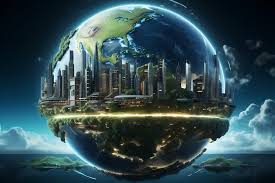In the vast tapestry of the cosmos, humanity often wonders: If we are not alone, what happens when the unknown touches our world? The phrase Alien Ground Zero conjures images of first contact, crash sites, clandestine government reactions, and the collision between everyday life and cosmic mysteries. In this blog post, I explore this concept, weaving speculative storytelling, thematic reflection, and practical imagination to give life to “Alien Ground Zero.” Whether you’re a science-fiction enthusiast, a writer looking for fresh ideas, or simply someone drawn to the mystery of alien encounters, this is for you.
1. The Concept of “Ground Zero” in an Alien Context
“Ground Zero” is a loaded term. Historically, it refers to the point of greatest damage (as in a bomb explosion) or the epicenter of catastrophic events. In applying it to aliens, Alien Ground Zero becomes both literal and metaphorical:
- Literal sense: a crash site, a landing zone, the place where an extraterrestrial spacecraft first interacts with Earth.
- Metaphorical sense: the moment and place where human belief systems, science, politics, or culture are irrevocably altered by the presence of an alien influence.
Thinking of it this way, Alien Ground Zero is the intersection of the cosmic and human realms. It is where the veil between “us” and “them” is pierced.
2. Imaginative Scenarios: What Could Alien Ground Zero Look Like?
Let me sketch a few possible scenarios to bring the idea to life:
Scenario A: Nighttime Crash in a Desert
In the barren quiet of a remote desert, a sudden flash lights up the sky. A metallic object plummets, scrapes across the dunes, and comes to rest with a hiss of escaping energy. Locals hear a distant roar, report strange lights, and in the early morning, the area is quarantined by military forces. Nearby, a scientist enters, cameras roll, and the world holds its breath.
Scenario B: Top Secret Underground Arrival
In a hidden subterranean facility in a remote region (say, Antarctica or a desert), an alien vessel is secretly delivered through a subterranean tunnel. The “ground zero” is not visible from above; rather, it is in a cavernous lab where alien matter is studied under controlled conditions. Only a select few know of its existence.
Scenario C: Urban Unexpected Contact
In a dense city, a UFO appears abruptly, hovering above a central square. Within seconds, electromagnetic interference blackouts block signals. Chaos ripples through city systems. Humans and aliens stand face to face in the urban “ground zero” zone, with media helicopters capturing live footage, panicked crowds streaming, and governments scrambling to respond.
Each scenario has its own charm, tension, and narrative stakes. The choice depends on what tone you want: suspenseful, secretive, dramatic, or catastrophic.
3. Themes and Motifs to Explore
When writing or reflecting on “Alien Ground Zero,” there are several rich thematic veins you can mine:
A. Secrecy and Disclosure
- Government cover-ups: How much is hidden from the public? What are the costs—ethical, social, personal—of keeping such secrets?
- Media manipulation: Who gets to shape the narrative? Are official statements truthful, or are they crafted to control panic?
B. Fear, Awe, and Wonder
- The emotional response to an alien arrival is likely to be complex: terror, fascination, confusion, reverence. Explore how individuals and communities react.
- The gulf between the known and the unknown can provoke existential questioning: What does it mean to be human in a universe where aliens exist?
C. Technology and Power Dynamics
- Alien technology might outstrip ours. How do humans respond — with adaptation, conflict, collaboration, sabotage?
- Power struggles might arise: military vs. scientists; nations jockeying for advantage; private corporations wanting to exploit alien tech.
D. Cultural and Spiritual Shock
- Different religions and belief systems might reinterpret the event (aliens as gods, demons, messengers).
- Some may see it as a cosmic test, a warning, a new dawn—or the end.
E. Identity, “Otherness,” and Coexistence
- What defines “us” and “them”? How do boundaries blur when humans interact with beings whose biology, cognition, or morality may be utterly alien?
- Could there be pathways for coexistence or mutual learning, or will conflict be inevitable?
4. Character Perspectives: Whose Eyes Do We See Through?
To ground the grandness of Alien Ground Zero in human terms, you might tell the story from one or more of these perspectives:
- The Scientist / Astrobiologist
Focused on understanding alien physiology, chemistry, or technology. Driven by curiosity, sometimes in tension with military or political agendas. - The Military or Intelligence Officer
Tasked with containment, defense, or even offense. Forced to make moral and strategic choices under pressure. - The Journalist / Citizen Reporter
On the ground, capturing the human story, chasing leaks, bringing truth (or propaganda) to light. - The Local Civilian / Witness
Someone caught in the event without prior knowledge. Their personal stakes make the macro event immediate and human. - The Alien (or Alien Observer)
Seeing Earth and humanity through alien eyes—whether as invader, explorer, refugee, or scout.
By shifting between these viewpoints, you can build tension, contrast motivations, and show how an event of cosmic scale affects individuals in diverse ways.
5. Plot Beats & Conflict Arcs
If you’re turning this into a fiction narrative (short story, novella, novel), here are some structural ideas:
- Inciting Incident: A strange meteor, radio signal anomaly, unexplained power surge, or eyewitness reports of UFOs.
- Rising Action: Investigations begin. Authorities respond. Strange phenomena increase (EMP pulses, disappearances, anomalous readings).
- Crisis or Midpoint: The actual contact — either a crash or the arrival of alien beings. Secrets are revealed; sides take shape.
- Climax: Confrontation, negotiation, betrayal, or catastrophe. The stakes become global.
- Falling Action / Resolution: Aftershock—how the world adapts or recovers, and how individuals are changed forever.
Within this skeleton, you can weave subplots: betrayal, love (across species?), espionage, moral dilemmas, scientific breakthroughs.
6. Writing Tips & World-building Notes
- Ground your alien elements in plausible science (or at least consistent pseudo-science). Give enough internal logic so the audience suspends disbelief.
- Introduce small, vivid details—strange symbols, odd materials, alien bioluminescence, incomprehensible languages.
- Keep perspectives shifting carefully—too many viewpoint changes can dilute tension; pick points to zoom out or zoom in.
- Balance exposition with action—don’t dump all your worldbuilding in one place. Let details emerge naturally as characters explore.
- Foreshadow early—strange signals, odd animal behavior, electromagnetic anomalies can hint that something is coming.
- Focus on consequences, not just spectacle—how do governments, societies, religions, and individuals deal with the aftermath?
7. Sample Excerpt & Tone Sketch
Here’s a short evocative passage to show tone:
The desert night cracked open with a thunderous roar. I awoke before dawn to the orange glow beyond the dunes.
Soldiers in full gear blocked the dirt road; their silhouettes flicked under spotlight beams. The air smelled of ozone. In the crater before me lay the hull of something… not of this Earth. Its surface shimmered—not metal, but something alive.
I raised my recorder, voice trembling, and whispered into the blackness: This is ground zero.
Moments later, a tendril of light unfurled from within. It glowed, pulsed, as though breathing.
You can use descriptive sensory detail: sight, sound, smell, tactile sensations. Let the reader feel the shock.
8. Why “Alien Ground Zero” Matters
- Reflection on human nature: When confronted with the unknown, how do we act? With curiosity, fear, aggression, humility?
- Mirror to contemporary concerns: Consider how we treat “others” in our world—immigrants, strangers, the alien in a social or political sense.
- Excitement & wonder: The idea that we’re not alone, that our world can shift in one moment, is deeply compelling.
- Story seed for other genres: You can turn it toward thriller, horror, philosophical sci-fi, political drama, or action-adventure.
9. Potential Subtopics for Future Posts / Extensions
- Interview with a “survivor” of Alien Ground Zero (fictional Q&A).
- Technical dossier: “Alien biology, materials, propulsion” as speculative science.
- The political fallout: How nations compete or cooperate after the event.
- Cultural reinterpretations: How religions, art, media change post-arrival.
- Alternative histories: What if Alien Ground Zero had occurred in 1947? Or 2025? Or in some future date?
Conclusion
“Alien Ground Zero” is a powerful and evocative concept: the place and moment where the cosmic unknown stakes a claim in our human story. Whether you’re a writer looking to plant your flag in a new narrative territory, or a reader intrigued by the possibilities, the idea invites you to imagine—and reimagine—how we’d respond when the skies open.








